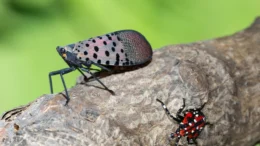From staff reports
Travelers to eastern Pennsylvania should be on the lookout for spotted lanternflies that might just hitch a ride on their vehicle.
Spotted lanternflies, which are native to China, India and Vietnam, were discovered in Berks County in 2014, and now 14 counties in eastern Pennsylvania are infested with them, according to the state Department of Agriculture website.
The state Department of Agriculture estimates spotted lanternflies could do $18 billion worth of damage to fruit trees, lumber, grapes and other crops.
Spotted lanternflies suck the sap from apple trees and other fruit trees as well as hardwood trees.
Not all crops are damaged to the same degree by the invasive insects that feed on but don’t necessarily kill trees.
The bugs are especially damaging to grapes. They suck the juice out of the grapes leaving behind withered grapes and sticky, mold attracting residue.
“There are vineyards in Berks county that look like they have been burned,” Shannon Powers, the state Department of Agriculture press secretary, said.
Spotted lanternflies are “plant hoppers,” Powers said, meaning the bugs primarily travel by hopping, not flying though they have wings when they are fully matured.
She said the risk of the flies spreading is high.
“To give you a point of comparison, spotted lanternflies are also invasive in South Korea (which is about the same size as Pennsylvania). They spread through the entire country in one year,” Powers said.
The bugs mostly spread by hopping onto a vehicle or product being transported and then hopping off when their transportation reaches it’s destination, Powers explained.
One reason the risk of the bugs spreading is so high is that their favorite food, an invasive species called the tree-of-heaven, grows along the highways, fences and railroads all across the state.
The tree-of-heaven grows quickly in clumps, spreads by the roots as well as seeds and is very difficult to kill, according to the Penn State Extension website.
Powers said Gov. Tom Wolf has designated a lot of money to go toward fighting the spread of the spotted lanternflies.
One area of work is researching a pesticide that will kill the spotted lanternflies without harming humans, other creatures or the environment, Powers said.
Products such as plants, grapevines and wood, as well as outdoor furniture, can’t be transported out of the quarantined counties. The counties include Berks, Bucks, Carbon, Chester, Dauphin, Delaware, Lancaster, Lebanon, Lehigh, Monroe, Montgomery, Northampton, Philadelphia and Schuylkill.
One way the agencies are killing the bugs is to leave one tree-of-heaven and wrap it with a sticky band (like flypaper) to trap the bugs.
Powers said the best thing to do is be vigilant and know what the bugs look like.
The Department of Agriculture advises that if anyone sees a spotted lanternfly they should immediately kill the bug. People are also encouraged to report sightings to the Department of Agriculture or Penn State Extension websites.
Powers said it is best to upload a picture of the insect for verification when making a report. She said inspectors will come and check reported sites for spotted lanternflies.
“We are doing our best to contain (the infestation) so it doesn’t come to you (residents of western Pennsylvania),” Powers said.





































